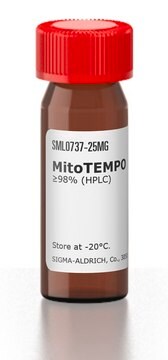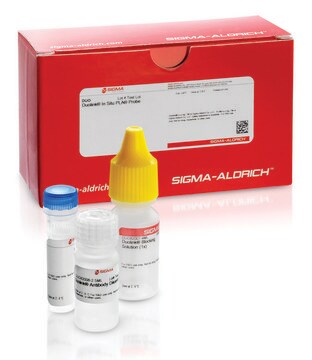A0185
Monoclonal Anti-Biotin−Peroxidase antibody produced in mouse
clone BN-34, purified immunoglobulin
Sinónimos:
Monoclonal Anti-Biotin
About This Item
Productos recomendados
origen biológico
mouse
Nivel de calidad
conjugado
peroxidase conjugate
forma del anticuerpo
purified immunoglobulin
tipo de anticuerpo
primary antibodies
clon
BN-34, monoclonal
envase
vial of 0.5 mL
técnicas
dot blot: suitable
flow cytometry: suitable
immunohistochemistry (formalin-fixed, paraffin-embedded sections): 1:300
indirect ELISA: 1:30,000
western blot (chemiluminescent): 1:80,000
isotipo
IgG1
temp. de almacenamiento
2-8°C
modificación del objetivo postraduccional
unmodified
¿Está buscando productos similares? Visita Guía de comparación de productos
Descripción general
Inmunógeno
Aplicación
- in immunohistochemistry
- in western blot
- as secondary antibody to detect the presence of aptamer on the membrane
In some applications, localization of biotinylated probes with avidin produces high background levels. Anti-biotin reagents may be substituted for avidin to decrease non-specific binding.
Acciones bioquímicas o fisiológicas
Monoclonal Anti-Biotin-Peroxidase antibody specific for biotin conjugated to various proteins. The antibody recognizes free biotin and biocytin using competitive ELISA. Using indirect ELISA or immunohistochemical staining, the antibody also recognizes biotin conjugated to various immunoglobulins. The product specificity has been evaluated using biotinylated goat antibodies to human and rabbit antigens coated on multiwell plates.
Forma física
Cláusula de descargo de responsabilidad
Not finding the right product?
Try our Herramienta de selección de productos.
Palabra de señalización
Warning
Frases de peligro
Consejos de prudencia
Clasificaciones de peligro
Skin Sens. 1
Código de clase de almacenamiento
12 - Non Combustible Liquids
Clase de riesgo para el agua (WGK)
WGK 2
Punto de inflamabilidad (°F)
Not applicable
Punto de inflamabilidad (°C)
Not applicable
Certificados de análisis (COA)
Busque Certificados de análisis (COA) introduciendo el número de lote del producto. Los números de lote se encuentran en la etiqueta del producto después de las palabras «Lot» o «Batch»
¿Ya tiene este producto?
Encuentre la documentación para los productos que ha comprado recientemente en la Biblioteca de documentos.
Nuestro equipo de científicos tiene experiencia en todas las áreas de investigación: Ciencias de la vida, Ciencia de los materiales, Síntesis química, Cromatografía, Analítica y muchas otras.
Póngase en contacto con el Servicio técnico






